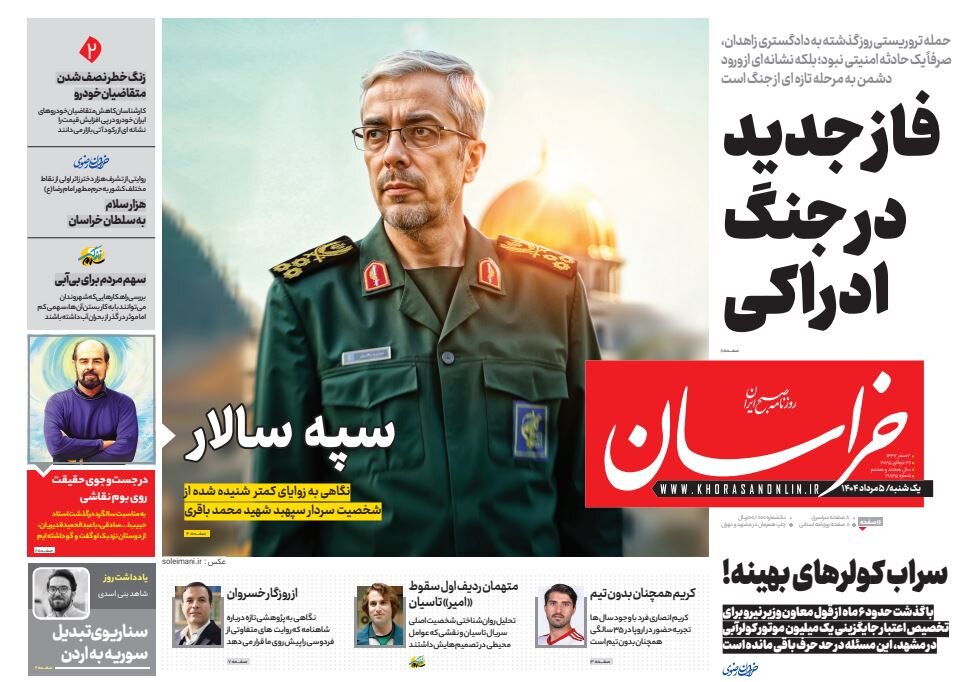Silence, claim of human rights, or political game?

TEHRAN - In an analysis, Khorasan commented on the recent terrorist attack on the courthouse in Zahedan (the capital of the southeastern province of Sisitan-Balouchestan) and said: The attack was not simply a security incident; rather, it is a sign that the enemy has entered a new phase of the war.
The incident is part of a larger project that has been engineered in Western and Zionist think tanks in recent months and has now entered implementation phase. The project is structured around three pillars: creating public fear and panic; creating a platform for separatist groups to mobilize; and instilling an alleged image of fragility of internal security. While Western media outlets always run headlines claiming support for Iranian people and defending human rights, they have now adopted a meaningful silence in the face of the attack on the courthouse of Zahedan. This silence not only shows their double standards, but also reveals that the concept of human rights is only a political tool for them rather than a human value. If the West truly defends humanity, it must condemn this attack and identify its perpetrators as terrorists, otherwise their slogans about anti-terrorism are nothing more than mere publicity.
Ettelaat: European troika threatens Iran again
In a note, Ettelaat addressed the European troika’s renewed threat to invoke the snapback mechanism that would return the UN sanctions against Iran that had been lifted under the 2015 nuclear deal officially called the JCPOA. It wrote: The leaders of the three European countries, Britain, France, and Germany, have once again threatened Iran to activate the snapback mechanism. Their threat against Iran comes at as Iran and Europe resumed their negotiations on Friday. The European troika’s call for “Iran to return to diplomacy” comes at a time while two months of indirect negotiations between Iran and the United States, which were being conducted with the mediation of Oman, were aborted as the Zionist regime launched an act of aggression against Iran and later and the United States joined the invading regime by bombing Iran’s nuclear facilities. Iran has announced it is firm to find a diplomatic solution to the nuclear issue, but insists that any negotiations require guarantees that aggressive attacks against Iran will not be repeated. European countries threaten to invoke the snapback mechanism and thereby reinstate all UN sanctions against Iran. Many analysts believe that the legal basis for this action lacks legitimacy, but some technical and diplomatic moves are also underway that could transform the future of Iran-Europe relations.
Kayhan: The superiority of missile power
Kayhan devoted its editorial to Iran's missile power in the June war with Israel. It wrote: In the 12-day war, Iran proved its capability to strike the enemy. Before that, the enemy had concluded that it was capable of striking Iran without Iran being able to respond effectively. Israeli sources recently revealed that two weeks before the start of the war, Netanyahu had told Donald Trump during a visit to the United States, "We will strike Iran so hard that after 24 hours, it will not be able to fire a missile at Israel for decades." Following the 12-day conflict, Israel and the United States—despite being the initiators—called for a ceasefire. It has become clear to them that they are unable to establish effective deterrence against Iran. They now recognize Iran’s ability to endure attacks and deliver powerful retaliatory blows, even under simultaneous pressure from both nations and despite the advanced weaponry possessed by the occupying regime.
Iran: Europe's sinister goal
In an interview with Seyyed Jalal Dehghani Firouzabadi, a professor of international relations, the Iran newspaper sought Europe's main goal in proposing to extend the snapback mechanism. He said: Europe's important goal in proposing to extend the snapback is to obtain more accurate information about the status of Iran's nuclear facilities and the level of its highly enriched uranium reserves. Even in the event of a possible restart of negotiations between Iran and the U.S., Europe will try to maintain its independent role and pursue its demands by using the leverage of the snapback. As a result, it must be acknowledged that the extension of the snapback mechanism was not intended to resolve the crisis, but rather to buy time and maintain the means of pressure on Iran. Therefore, the Islamic Republic of Iran must clarify its position on the snapback issue in the remaining short time until the expiration of Resolution 2231, because in the next six months, it seems unlikely that Europe will back down from its decision to activate it. Otherwise, this European position will simply pave the way for blaming Iran and may even serve as an excuse for Trump to return to the maximum pressure campaign or justify renewed Israeli attacks.
